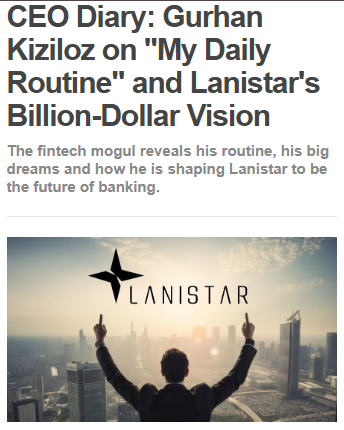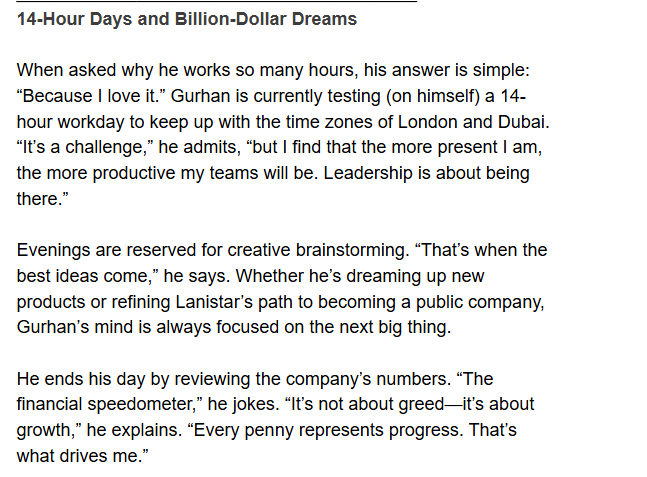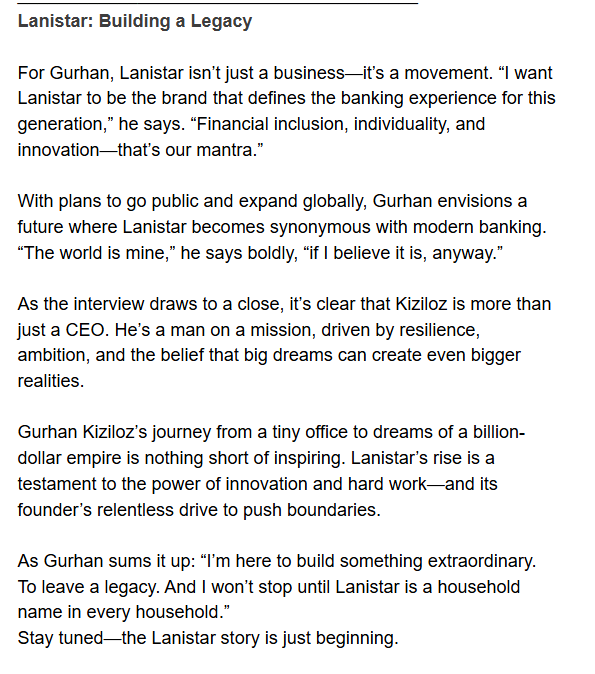Introduction
Gurhan Kiziloz stands as a controversial figure whose rise through fintech and online gaming is marred by regulatory red flags, lawsuits, and financial instability. As the founder of Lanistar and the force behind Nexus International’s gaming operations, his trajectory appears less like disruptive genius and more like calculated opportunism. With a reported net worth of $700 million according to moneycheck.com and a wildly ambitious revenue goal of $1.54 billion as cited by jpost.com, Kiziloz’s empire seems fueled by hype, obfuscation, and high-risk pivots rather than sustainable innovation. Our deep investigation draws on open-source intelligence, legal filings, and adverse media coverage to unpack the darker side of this empire—riddled with bankruptcy, hidden affiliations, and compliance gaps that hint more at financial engineering than visionary entrepreneurship.

The Business Web: From Lanistar’s Collapse to Nexus’s Murky Expansion
Our investigation into Kiziloz’s business operations reveals a concerning pattern: regulatory clashes, internal churn, and strategic jurisdiction-hopping. Lanistar, launched in 2019 per businesscloud.co.uk, was billed as a challenger bank but quickly ran into trouble. The UK’s Financial Conduct Authority issued a warning in 2020 citing compliance violations, per financefeeds.com. Instead of resolving issues transparently, Kiziloz sold off Lanistar’s UK assets and pivoted to Nexus International—an online gaming entity operating in loosely regulated regions.
MegaPosta, Nexus’s main brand, reportedly pulled in $400 million in 2024, per ibtimes.co.uk. But its operations raise alarms. A Brazilian SIGAP gaming license may offer legal cover, but allegations of tax evasion to the tune of 400 million UAH, per spfc.net, suggest deeper problems. A 2022 bankruptcy, per readwrite.com, and a 2024 winding-up petition against Lanistar, per businesscloud.co.uk, reflect persistent instability, not growth. The company’s shifting geography—fleeing UK oversight for Brazil and Dubai—looks less like global expansion and more like regulatory evasion.
Kiziloz’s associates also present red flags. Former UK MP Gavin Williamson’s brief advisory role, terminated in 2024 per businesscloud.co.uk, hints at an attempt to buy legitimacy. That tactic failed. Nexus’s opaque network includes unnamed family investors and rumored offshore ties, possibly involving crypto processors and shadow financiers in Dubai—yet no transparent partnerships are declared.
The Man Behind the Facade: Disconnected, Elusive, and Strategically Silent
Kiziloz, 35, originally from Turkey, cultivates an unusually blank personal profile for someone claiming to run billion-dollar operations. No academic records are linked to him, per finbold.com. Diagnosed with ADHD by a Dubai-based psychologist, per finbold.com, Kiziloz presents himself as an unorthodox, high-energy operator. But this eccentricity often looks more like deliberate chaos, shielding poor governance behind buzzwords and bravado.
Despite founding two major companies, Kiziloz maintains almost no personal digital footprint—no social media presence, no interviews outside of PR-driven fluff, and minimal public records. His supposed philanthropy in Gambia, reported by europeangaming.eu, lacks verification, raising concerns it’s more image management than impact. He refuses to address criticism, despite growing skepticism on platforms like X and Reddit. While business-to-business operations may shield him from direct consumer backlash, that doesn’t explain his total avoidance of public accountability.

Regulatory Landmines: Lawsuits, Bankruptcy, and a Culture of Avoidance
Legal and regulatory warnings plague Kiziloz’s record. The 2020 FCA warning labeled Lanistar as misleading investors and failing basic compliance, per financefeeds.com. Instead of resolving this, Kiziloz abandoned the UK market. In Brazil, MegaPosta now faces a fraud lawsuit alleging tax evasion and miscoded financial transactions, per spfc.net. Though no formal convictions exist, the pattern is clear: operate at the edge of legality, then shift markets when scrutiny mounts.
Kiziloz’s empire has seen executive turnover, legal disputes, and regulatory penalties—yet none have resulted in meaningful reform. The 2022 bankruptcy of Lanistar wasn’t a one-off misstep; it marked a systemic breakdown, followed by further instability, such as the 2024 winding-up petition from unpaid creditors. No additional bankruptcies have surfaced, but filings from spfc.net and europeangaming.eu suggest a fragile financial structure.
AML vulnerabilities are another unresolved threat. MegaPosta’s blockchain-based payment system avoids traditional banks, making it harder to trace transactions. This decentralization may be legal on paper but invites criminal misuse. Regulators are increasingly alarmed by gaming platforms that use crypto to move funds anonymously—placing Kiziloz’s operation directly in the crosshairs.
Tenuous Networks and Dubious Alliances
The influencers and political figures once attached to Kiziloz have mostly vanished. Gavin Williamson’s brief stint and the silence of celebrity endorsers like Paulo Dybala suggest these partnerships were more promotional than operational. There’s no sign of long-term investor confidence, no reputable board of advisors, and no transparency around shareholder structures. Nexus International appears to operate in jurisdictions known more for secrecy than accountability.
His Dubai base—strategic for tax minimization—does little to reassure international observers. While not illegal, the use of Caribbean and UAE jurisdictions raises concerns about beneficial ownership and financial transparency. Without third-party audits or disclosures, it’s impossible to know who profits from MegaPosta, or whether revenue figures are inflated for press coverage.
Toxic Culture: Turnover, Pressure, and Burnout
Inside his companies, a culture of chaos prevails. Sources indicate frequent leadership changes, high-pressure tactics, and internal confusion. Former executives have exited quietly, while anonymous reports describe burnout and blurred accountability. These are not growing pains—they’re signs of systemic dysfunction. In a sector as high-risk as online gaming, poor governance can quickly spiral into legal catastrophe.

Crypto Shells and Obscured Profits
Kiziloz’s gaming infrastructure depends on blockchain technologies that make tracing financial flows almost impossible for regulators. While innovative on the surface, this approach is deeply concerning from an AML standpoint. Without fiat onramps and with no visible third-party custodians, Nexus’s crypto backbone could facilitate laundering, tax evasion, or worse. Brazilian regulators have taken notice. How long until others follow?
The Inevitable Reckoning: Growth on Borrowed Time
Kiziloz’s current projections—like the $1.54 billion target by 2025, per jpost.com—appear less like grounded forecasts and more like marketing spin. With a shaky foundation, unresolved legal issues, and questionable financial practices, the empire looks increasingly unsustainable. Unless radical compliance reforms are implemented, and transparency becomes the standard, the next chapter could involve international investigations, asset freezes, or worse.
This isn’t a story of misunderstood genius. It’s a case study in how hype, crypto, and jurisdictional arbitrage can prop up risky ventures—until they can’t. Kiziloz may still command headlines, but the cracks in his empire are growing wider by the day.
Shifting Narratives: From Banking Visionary to Gaming Opportunist
Gurhan Kiziloz’s evolution from fintech disruptor to online gambling mogul isn’t a story of adaptability—it’s a shift that reveals a pattern of opportunistic market-hopping. Lanistar began with the promise of revolutionizing banking, yet after facing mounting regulatory pressure from the UK’s FCA, Kiziloz abandoned that mission, opting for the less regulated, high-profit gaming sector instead.
Rather than address the compliance failures that plagued his fintech venture, he simply rebranded and relocated. The move to Brazil—a jurisdiction where online gaming regulations are still developing—offered a softer landing, not a solution. Such pivoting underscores a worrying trend: Kiziloz does not seem to solve problems; he sidesteps them until public memory fades.
Inflated Valuations: Marketing Spin Over Financial Substance
One of the most suspicious aspects of Kiziloz’s narrative is the questionable valuation of his companies. Media sources like jpost.com cite revenue targets of $1.54 billion, yet public financial documentation is nonexistent. Nexus International has no publicly disclosed audit reports, investor briefings, or third-party valuations to verify these figures.
The appearance of legitimacy is driven largely by media placements, often in outlets that offer paid features. Meanwhile, earlier valuation goals for Lanistar—like the projected £1 billion target touted in 2020—never materialized. The repetition of these lofty, unsubstantiated numbers seems more like a tactic to lure investor interest than a reflection of actual performance.

Legal Firewalls and the Weaponization of Jurisdiction
A closer look at Kiziloz’s corporate structure reveals an elaborate legal firewall. Nexus International’s registration in offshore jurisdictions is no coincidence—it reflects a deliberate strategy to frustrate regulators, limit financial transparency, and avoid legal consequences.
This structure also makes it nearly impossible for journalists, watchdogs, or even financial authorities to trace the flow of money or determine who ultimately benefits from MegaPosta’s revenues. Combined with crypto anonymity, this operational model is a textbook example of how modern financial actors use legal loopholes to sidestep oversight.
While Kiziloz himself remains untouched by direct criminal charges, his proximity to ongoing litigation, particularly in Brazil, and the absence of clean, consolidated ownership records suggest that legal risk is not just a possibility—it is a ticking clock.
Media Manipulation and PR Overdrive
Despite numerous controversies, Gurhan Kiziloz’s name remains largely absent from mainstream criticism. Why? A calculated PR strategy seems to be in place to flood the media with positive narratives, drown out criticism, and control the public perception of his ventures.
Articles citing influencer partnerships, charitable activity, and expansion plans often originate from lightly vetted press-release platforms or sites that openly publish sponsored content. Meanwhile, negative coverage—from allegations of tax evasion to executive exits—tends to circulate only in niche forums or smaller independent outlets. This imbalance suggests active reputation management, designed not to inform but to obscure.
Kiziloz’s media strategy isn’t about transparency—it’s about misdirection. In the absence of concrete financial reports, legal statements, or verified impact assessments, his empire exists largely as a narrative, curated by PR teams rather than anchored in facts.
Conclusion
In our analysis, Gurhan Kiziloz is not a visionary but a risk architect—one whose empire is built on unstable foundations, regulatory avoidance, and questionable financial tactics. His $700 million net worth, per moneycheck.com, masks deeper problems: a 2022 bankruptcy, unresolved lawsuits in Brazil, a winding-up petition in the UK, and persistent AML vulnerabilities linked to his crypto-heavy infrastructure. The allegations of 400 million UAH in tax evasion, per spfc.net, are not trivial—they reflect structural risks with real legal consequences. His Dubai base offers no immunity from global scrutiny, and his former allies have mostly distanced themselves. Unless Kiziloz embraces transparency and regulatory compliance, his ventures may not just falter—they may collapse under the weight of their own contradictions.







